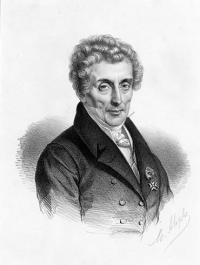This is an old revision of the document!
Memoir of Cherubini
Chiefly compiled from the French of Mons. François-Joseph Fétis
 This admirable composer was born at Florence, on the 8th Sept., 1760, and he received the baptismal name of Maria Luigi Carlo Zenobio Salvador Cherubini. He mastered the first elements of music before he was six years old. At the age of nine, he had lessons of harmony and accompaniment from Bartolomeo Felici and his son Alessandro. On the death of these two masters, he obtained instruction from Pietro Bizzari and Guiseppe Castrucci, who promoted his studies in composition, and gave him some idea of vocal art.
This admirable composer was born at Florence, on the 8th Sept., 1760, and he received the baptismal name of Maria Luigi Carlo Zenobio Salvador Cherubini. He mastered the first elements of music before he was six years old. At the age of nine, he had lessons of harmony and accompaniment from Bartolomeo Felici and his son Alessandro. On the death of these two masters, he obtained instruction from Pietro Bizzari and Guiseppe Castrucci, who promoted his studies in composition, and gave him some idea of vocal art.
The progress he made was so rapid, that as early at 1773, before he had completed his thirteenth year, there was a solemn mass of his performed at Florence. This work was followed by several others, both sacred and secular; and the public greeted with warm applause those early productions of a genius already remarkable. The grand duke of Tuscany, Leopold II. – a prince distinguished no less by his enlightened taste for the fine arts, than by his mild and benevolent rule – denoted his estimate of young Cherubini's talent by granting him, in 1778, a pension which should enable him to repair to Bologna and study under Sarti. Four years were spent by the young artist in this school, acquiring by assiduous labour a profound knowledge of counterpoint and of ancient fugal style.
To Sarti's excellent precepts, Cherubini's extensive acquaintance with the classical Italian composers is mainly owing; while to this master's judicious system – not only imparting to his pupils solid scientific instruction, but exercising their fertility of invention by entrusting them with the composition of subordinate portions of his own operas – may be traced Cherubini's ready skill in writing down his thoughts. Sarti's scores contain many pieces composed by Cherubini.
Before permanently quitting the tutelage of his master, Cherubini wrote the opera Quintus Fabius, which was first performed in 1782, and which was followed by seven other works, that made their appearance at Florence, Leghorn, Rome, and Mantua. In 1784, Cherubini left Italy for London. Here he wrote La Finta Principessa, an opera buffa; and brought out his Giulo Salino, of which he had re-written several pieces. He also contributed several new pieces to the score of Paisiello's Marchese di Tulipano; after which he repaired to Paris, with the intention of settling there. But he was immediately summoned to Turin, that he might write his opera of Iphigenia in Aulide, which obtained such marked success, that Marshesi made choice of this work for the autumn of 1788, at the theatre of La Scala, in Milan.
On his return to London, in 1787, Cherubini filled the post, (and with the title) of composer to His Majesty's Theatre. Here he brought out Cimarosa's Giannina e Bernadone, and Paisiello's Gli Schiavi per amore, with other works, to which he contributed several charming pieces. Burney alludes with eulogy to these productions of Cherubini's genius, in his History of Music. At Paris, in 1788, Cherubini wrote his first French opera, entitled Démophon; it appeared on the opera stage, the 2nd of December of that year, but met with slight success. Many causes operated to occasion this cold reception of a work, which was an experiment in the style of composition where Cherubini seemed to have relinquished those peculiarities of Italian music he had till then cultivated. The chief of these causes was the interest taken by the public in Vogel, – the auther of another Démophon; the overture to which had attained considerable favor and celebrity. This young musician had expired the same year, leaving his opera completed. It was performed during the summer; and although the remainder of the work did not keep pace with the merit of its overture, the public regarded it with a partiality which prevented due interest in Cherubini's production. In this latter, there was a creative power superior to anything yet achieved in France; which power being beyond the comprehension of the opera-pit critics of the time, did not compensate, in their eyes, for the want of spirit and dramatic interest that may be alleged against the score as a whole. Of all its composer's works, Démophon is now the least known, even to his admirers; nevertheless there are pieces in it, (particularly a chorus, “Ah! vous rendes la vie”) which, for skill of instrumentation, for disposal of the voices, and for purity of style, were, at the period when the opera was written, truly original creations, and were the heralds of a new school.